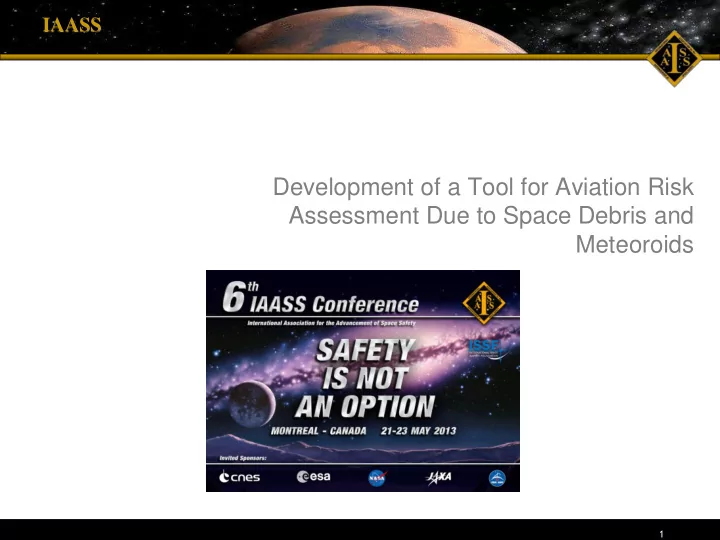

IAASS Development of a Tool for Aviation Risk Assessment Due to Space Debris and Meteoroids 1
IAASS Background ~40 large space debris objects (>800 kg) reenter randomly each year 10 to 40% of mass survives reentry and impacts the Earth’s surface posing hazard to people and property Debris impacts in long, thin ground footprint Location of uncontrolled reentries is unpredictable 2
IAASS Risk for Aviation Risk for Aviation? For controlled reentries or space vehicles launches: closure of airspace areas where the risk is unacceptable For uncontrolled re-entries: not currently quantified or controlled on event-basis Annual debris collision risk for aviation estimated* to be ~ 3x10 -4 January 2012, Russian Phobos-Grunt uncontrolled re-entry. EUROCONTROL received a NOTAM from Russian authorities, requesting to close Europe airspace for 2h (calculated cost ~ € 20 Million) IAASS has decided to fill the gap by developing a tool to assess the risk for Aviation due to re-entering space debris and meteoroids *Risk to Commercial Aircraft from Re-entering Space Debris-R. Patera http://www.scientificamerican.com/ 3
IAASS Study Logic Consider fragmentation models an input (generic available) Adapt single-event methods used for ground population Evolve method for annual aviation risk assessment* • Add model for space debris re-entry flux • Add model for meteoroids entry flux • Add commercial transport air traffic density map for major regions (Europe, US, Japan, Middle East, China) • Improve aircraft vulnerability models Outputs for single re-entry or annual risks Probability of impact Probability of accident Collective risk of casualties *Risk to Commercial Aircraft from Reentering Space Debris - R. Patera 4
IAASS Study Phases First phase set for completion in Fall of 2013: Multiple organizations assess state-of-the-art in each area Air-traffic density mapping Aircraft probability of impacts computation Aircraft vulnerability to debris impact Later phases Algorithm development Database development Improvement of aircraft vulnerability models Software design: requirements, specification, architecture, coding, testing, validation 5
Recommend
More recommend